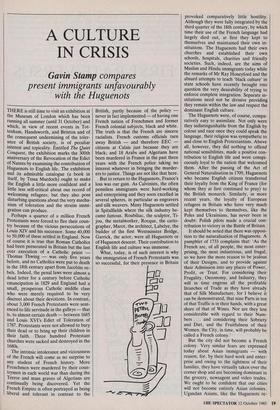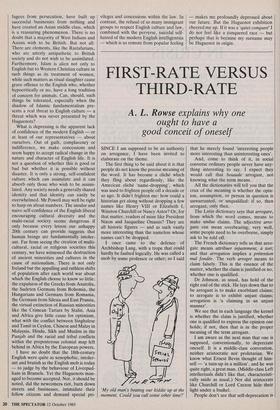A CULTURE IN CRISIS
Gavin Stamp compares
present immigrants unfavourably with the Huguenots
THERE is still time to visit an exhibition at the Museum of London which has been running all summer (until 31 October) and which, in view of recent events in Tot- tenham, Handsworth, and Brixton and of the consequent undermining of the toler- ance of British society, is of peculiar interest and topicality. Entitled The Quiet Conquest, the exhibition marks the 300th anniversary of the Revocation of the Edict of Nantes by examining the contribution of Huguenots to English life. The exhibition and its admirable catalogue (a book in itself, by Tessa Murdoch) ought to make the English a little more confident and a little less self-critical about our record of welcoming refugees; but they also pose disturbing questions about the very mecha- nism of toleration and the strains immi- gration can produce.
Perhaps a quarter of a million French Protestants were forced to flee their coun- try because of the vicious persecutions of Louis XIV and his successor. Some 40,000 to 50,000 of these settled in England. Now of course it is true that Roman Catholics had been persecuted in Britain but the last ever execution of a Catholic priest Thomas Thwing — was only five years before, and no Catholics were put to death in the 18th century apart from Jacobite re- bels. Indeed, the penal laws were almost a dead letter for a century before Catholic emancipation in 1829 and England had a small, prosperous Catholic middle class who were merely required to be very discreet about their devotions. In contrast, about 3,000 French Protestants were sent- enced to life servitude in the galleys — that is, to almost certain death — between 1685 and Louis XVI's Edict of Toleration of 1787. Protestants were not allowed to bury their dead or to bring up their children in their faith. Three hundred Protestant churches were sacked and destroyed in the 1680s.
The intrinsic intolerance and viciousness of the French will come as no surprise to any student of French history. More Frenchmen were murdered by their coun- trymen in each world war than during the Terror and mass graves of Algerians are continually being discovered. Yet the French Empire is often portrayed as being liberal and tolerant in contrast to the British, partly because of the policy never in fact implemented — of having one French nation of Frenchmen and former French colonial subjects, black and white. The truth is that the French are sincere racialists. French customs officials turn away British — and therefore EEC — citizens at Calais just because they are black; and 18 Arabs and Algerians have been murdered in France in the past three years with the French police taking no interest whatever in bringing the murder- ers to justice. Things are not like that here.
But to return to the Huguenots, France's loss was our gain. As Calvinists, the often penniless immigrants were hard-working and enterprising and they soon excelled in several spheres, in particular as engravers and silk weavers. Many Huguenots settled in Spitalfields where the silk industry be- came famous. Roubiliac, the sculptor, Ti- jou, the metalworker, Rocque, the carto- grapher, Marot, the architect, Labelye, the builder of the first Westminster Bridge, Garrick, the actor, were all Huguenots or of Huguenot descent. Their contribution to English life and culture was immense.
What, today, is of such interest is why the immigration of French Protestants was so successful, for their presence in Britain provoked comparatively little hostility. Although they were fully integrated by the third quarter of the 18th century, by which time their use of the French language had largely died out, at first they kept to themselves and maintained their own in- stitutions. The Huguenots had their own churches and established their own schools, hospitals, charities and friendly societies. Such, indeed, are the aims of Muslim and Hindu immigrants today while the remarks of Mr Ray Honeyford and the absurd attempts to teach 'black culture' in state schools have recently brought into question the very desirability of trying to enforce complete integration. Separate in- stitutions need not be divisive providing they remain within the law and respect the dominant English culture.
The Huguenots were, of course, compa- ratively easy to assimilate. Not only were they indistinguishable from the English by colour and race once they could speak the language, their religion was sympathetic to and close to English Protestantism. Above all, however, they did nothing to offend national sensibilities, made a positive con- tribution to English life and were conspi- cuously loyal to the nation that welcomed them. After the passing of the Act of General Naturalisation in 1709, Huguenots who became English citizens transferred their loyalty from the King of France (for whom they at first continued to pray) to the British monarch. Similarly, in more recent years, the loyalty of European refugees in Britain who have very much kept themselves to themselves, like the Poles and Ukrainians, has never been in doubt: Polish pilots made a crucial con- tribution to victory in the Battle of Britain.
It should be noted that there was opposi- tion to the naturalisation of Huguenots. A pamphlet of 1733 complains that: 'As the French are, of all people, the most enter- prising, the most industrious, and frugal, so we have the more reason to be jealous of their Designs, and to provide against their Admission into any places of Power, Profit, or Trust. For considering their Frugality, Oeconomy, and Industry, they will in time engross all the profitable Branches of Trade as they have already that of Silk Manufacture, for I believe it can be demonstrated, that nine Parts in ten of that Traffic is in their hands, with a great share of that of Wines. Nor are they less considerable with regard to their Num- bers . . . and considering their Sobriety and Diet, and the Fruitfulness of their Women, the City, in time, will probably be called a French colony.'
But the city did not become a French colony. Very similar fears are expressed today about Asian immigrants — with reason, for, by their hard work and enter- prise and owing to the tightness of their families, they have virtually taken over the corner shop and are becoming dominant in the grocery, newsagent and video trades. We ought to be confident that our cities will not become entirely Asian colonies. Ugandan Asians, like the Huguenots re- fugees from persecution, have built up successful businesses from nothing and have created an Asian middle class, which is a reassuring phenomenon. There is no doubt that a majority of West Indians and Asians wish to be British. But not all. There are elements, like the Rastafarians, who are utterly antipathetic to British society and do not wish to be assimilated. Furthermore, Islam is alien not only to English but to Western Christian culture in such things as its treatment of women, while such matters as ritual slaughter cause grave offence to the English who, whether hypocritically or no, have a long tradition of concern for animals. Can, should, such things be tolerated, especially when the shadow of Islamic fundamentalism pre- sents a real threat to English culture — a threat which was never presented by the Huguenots?
What is depressing is the apparent lack of confidence of the modern English — or at least of our representatives — about ourselves. Out of guilt, complacency or indifference, we make concessions and seem happy to accept radical change in the nature and character of English life. It is not a question of whether this is good or bad but whether it is possible without disaster. It is only a strong, self-confident culture which can assimilate and it can absorb only those who wish to be assimi- lated. Any society needs a generally shared identity and that identity can easily be overwhelmed. Mr Powell may well be right to harp on about numbers. The insular and naive self-confidence of the English liberal encouraging cultural diversity and the multi-racial society seems dangerous if only because every lesson our unhappy 20th century can provide suggests that human beings are fundamentally intoler- ant. Far from seeing the creation of multi- cultural, racial or religious societies this century, we have witnessed the destruction of ancient minorities and cultures in the cause of nationalism. There is not only Ireland but the appalling and ruthless shifts of population after each world war about which the English choose to know so little: the expulsion of the Greeks from Anatolia, the Sudeten Germans from Bohemia, the Hungarians and Germans from Romania, the Germans from Silesia and East Prussia, the virtual extinction of Russian minorities like the Crimean Tartars by Stalin. Asia and Africa give little cause for optimism, what with the conflict between Singhalese and Tamil in Ceylon, Chinese and Malay in Malaysia, Hindu, Sikh and Muslim in the Punjab and the racial and tribal conflicts within the preposterous colonial map left behind in Africa by the European powers.
I have no doubt that the 18th-century English were quite as xenophobic, intoler- ant and brutish as the English mob is today — to judge by the behaviour of Liverpud- lians in Brussels. Yet the Huguenots man- aged to become accepted. Nor, it should be noted, did the newcomers riot, burn down streets and businesses, intimidate their fellow citizens and demand special pri-
vileges and concessions within the law. In contrast, the refusal of so many immigrant groups to respect English culture and law, combined with the perverse, suicidal self- hatred of the modern English intelligentsia — which is so remote from popular feeling
— makes me profoundly depressed about our future. But the Huguenot exhibition cheered me up. If it was a 'quiet conquest' I do not feel like a conquered race — but perhaps that is because my surname may be Huguenot in origin.























































 Previous page
Previous page